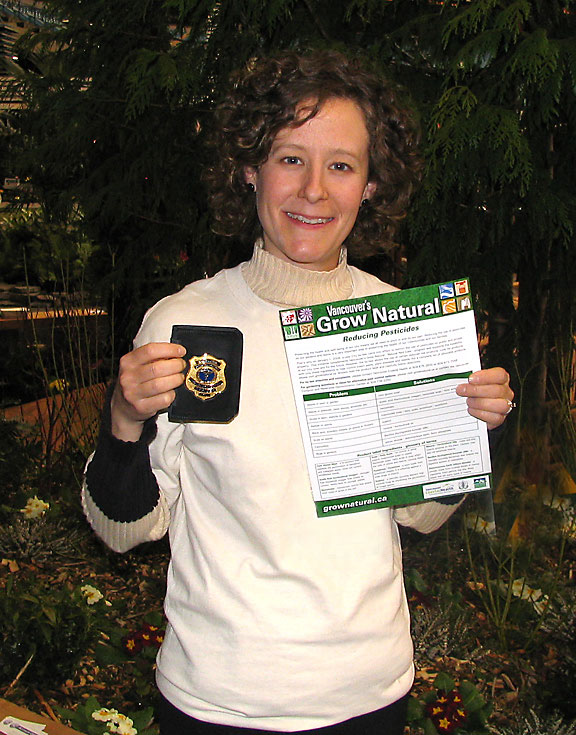City Farmer's Pesticide Reduction Resources

Photo Caption: Vancouver Coastal Health officer holding her badge and educational material promoting 'Reducing Pesticides' as part of the City's "Grow Natural" program.
"As of January 1, 2006, the use of outdoor pesticides on lawns and in gardens will be regulated by section 5.17 of the Health By-Law No. 6580. Application of pesticides, including insecticides, herbicides, and fungicides, will be restricted. Certain conditions will need to be met before pesticides will be permitted provided they are listed in Schedule A to the by-law."
You can read about the new by-law on the Grow Natural web site:
Pesticide Use Restriction By-law for
2006
and read the by-law here:
PDF of HEALTH BY-LAW
NO. 6580
This PDF is 39 pages long. See section 5.17 (pages
28, 29) and Schedule A (pages 37, 38)
Important Books
Pollinator
Conservation Handbook
"The Pollinator Conservation Handbook is a
publication by the Xerces Society and the Bee Works. It is the first
comprehensive book on the conservation of native bees, butterflies, and
other native pollinator insects and is an indispensable resource for
gardeners, farmers, and managers of parks, recreational areas, and wild
lands. The Handbook guides the reader through the steps needed to create
and enhance habitat for insect pollinators and contains information on
selecting and planting forage flowers, providing nesting and egg-laying
sites for bees, butterflies, and other insects, and caring for your
pollinator habitat over time."
Butterfly Gardening: Creating Summer Magic in Your
Garden
"Butterfly Gardening includes close-up color
photographs of butterflies and the plants that attract them, and writing
by eminent authors on the subjects of butterflies, gardening, and
conservation. Sample garden designs; a master plant list; and chapters
on moths in the garden at night, butterfly watching, butterfly
photography, and native plant conservation make this a unique and
informative reference."
BC Biological Suppliers
Ladybugs, nematodes, mites and other biologicals can be purchased at many retails stores. If you can't find what you are looking for, contact these wholesalers and they will help you.
The Bug Lady
www.thebuglady.ca
PO Box 731
Errington, BC V0R 1V0
Email: info@thebuglady.ca
Phone: 250-951-1973
Applied Bio-Nomics Ltd.
www.appliedbionomics.com
Local distributor
Westgro Sales Inc.
Delta, B.C.
(604) 940-0290
Attn Biological Dept
Bug Factory
www.thebugfactory.ca
Angela Hale
1636 East Island Highway
Nanoose Bay BC V9P 9A5
Canada
PH 250 468 7912
Email ahale@thebugfactory.ca
Terralink Horticulture Inc.
www.terralink-horticulture.com
Contact Sherri or Michelle
464 Riverside Road South
Abbotsford BC V2S 7M1
Canada
PH 604 864 9044
Organic Fertilizers for your Lawn and Garden
Once again, your local retailer should have natural fertilizers to help you feed your plants. If they don't, these suppliers will direct you to appropriate products.
Certified Organic Associations of British Columbia has an excellent list of approved products and manufacturers.
Brand Name Product List for Crop Production
Certified Organic Associations of British Columbia
Quality Wholesale Limited
Quality Wholesale Limited
8417 Main Street
Vancouver BC
Phone: 604.321.5858
Gaia Green Products Ltd.
Gaia Green Products Ltd.
9130 Granby Road
Grand Forks, British Columbia
Canada V0H 1H1
Phone:
250-442-3745
Toll-Free: 1-800-545-3745 (Canada Only)
Email: info@gaiagreen.ca
Greenstar Plant Products
Greenstar Plant Products
9850 - 201st Street
Langley, B.C. V1M 4M3 Canada
E-Mail: info@getgreenstar.com
Phone: 604.882.7699
Toll Free: 888.747.4769
